- What's The Matter Baby/Your Loving Ways (Pye 7N 15702) 1964
- This Is Love/You Could Be Fun (At The End Of The Party) (Pye 7N 15824) 1965
(the A-side also features Danny King)- My Girl/Shimmy Shammy Jingle (ABC 10752) 1965 (U.S. release only)
Carl Wayne and The Vikings
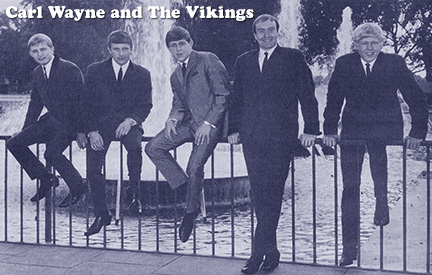
BIRMINGHAM
Updated January, 2020
Terry Wallace guitar, vocal
John "Johnny" Mann guitar, vocal
George "Duke" Mann lead vocal, guitar (left 1959)
Allan Compton drums (left 1961)
Dave Hollis drums (joined 1961, left 1965)
Barry Harber bass guitar (joined 1961, left 1964)
Keith Powell lead vocal (Joined 1960, left 1962)
Carl Wayne lead vocal (joined 1961)
Chris "Ace" Kefford bass guitar, vocal (joined 1964)
Bev Bevan drums (joined in 1965)
"We had records out which meant we could say we were 'Pye recording stars' on the posters"

This band was very well known throughout the West Midlands during the early 1960s. They are significant in rock music history due to three of the line-up becoming founding members of The Move who evolved into the world-famous Electric Light Orchestra (ELO) in the 1970s.
In 1958 a skiffle group called "The Vikings" was formed by Terry Wallace from Nechells, Birmingham. The group's lead vocalist was George "Duke" Mann whose younger brother Johnny Mann also joined as guitarist. Allan Compton who played drums joined them along with "Johnny Jolly" on tea chest bass. Another early group member was Mike Cope who played slide guitar.
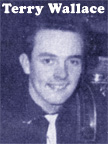
With the decline of the skiffle craze, The Vikings exchanged their acoustic guitars for electric ones and became a rock 'n' roll band. They began to play an ever increasing number of gigs in halls and youth clubs but like many young groups, the line-up was to change a number of times.
Duke Mann was forced to leave The Vikings and do National Service with his place being taken by Robert Hughes whose stage name was "Bobby Valantine". Barry Harber joined as bass guitarist and Dave Hollis came in on drums.
Tragedy struck when their lead guitarist John Kirby was paralysed in a car accident. Their lead vocalist Bobby Valentine decided to leave and his place was taken in 1960 by Keith Powell whose father also became manager of the group (see Keith Powell and The Valets).
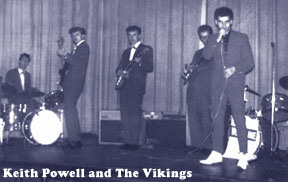
Keith Powell from Bordsley Green was born into a show business family. By the time he was fourteen, Keith was singing on-stage with a dance band while also considering becoming a professional actor. Keith Powell not only had a good voice but also the movie star looks which provided the added benefit of a large female following. This resulted in The Vikings' bookings increasing considerably over the next year with the band now traveling further afield and even as far as Great Yarmouth.
"I'd performed my hero's song and he'd applauded my efforts"
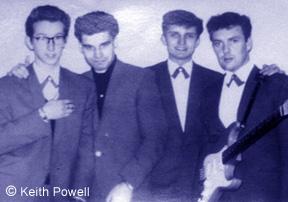
Terry Wallace when interviewed by Laurie Hornsby for his excellent book Brum Rocked! recalled an experience at one of their gigs; "A big song of the day was 'Twenty Flight Rock' by Eddie Cochrane. I was playing it at a coffee bar in Coventry when I became aware of a fellow in front of me and just staring. At the end of the song, he applauded more loudly than anyone and the party he was with began laughing."
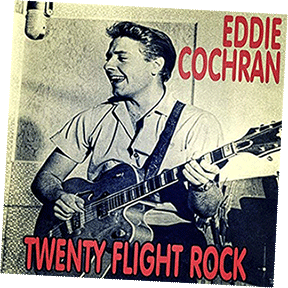
"I suddenly recognized them as Gene Vincent and Big Jim Sullivan. The guy in front of me, it was the man himself Eddie Cochrane. He waved to me and they all headed out of the coffee bar. They were on a national tour and had played Coventry that evening. I'd performed my hero's song and he'd applauded my efforts. A couple of days later he was gone - killed in a road crash in Chippenham."
Colin Tooley was born August 18, 1943 and lived in Hodge Hill, Birmingham. His first band was called "The G-Men" who formed in the late 1950s during the skiffle craze and they arranged dances at The Curzon Coffee Bar and in a church hall.
Always the businessman, Colin collected the takings at the door and he remembered his pockets becoming so heavy with half crowns he had difficulty keeping his trousers from falling down. At this time he was singing and playing bass guitar although his ability to play the instrument was apparently questionable!
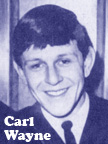
Colin Tooley turned professional when he joined Keith Powell and The Vikings in 1961 as temporary replacement singer when Keith Powell became ill and was unable to complete some bookings. For the role of front-man, Colin Tooley changed his name to "Carl Wayne" - reportedly after famous movie star John Wayne, with the suitably Scandinavian "Carl" to fit the "Vikings" theme.
While wearing a new tailored pink suit on stage, Carl Wayne proved so popular with the audience that when Keith Powell returned, Carl Wayne was allowed to stay and perform regularly in the group as second singer with the band's name being changed to "Keith Powell, Carl Wayne & The Vikings".
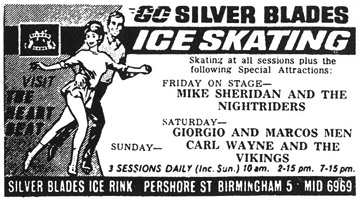
Inevitably and within a year, friction developed between Keith Powell and Carl Wayne so Keith left along with his father who was the group's manager, and went on to form "The Valets" (see Keith Powell and The Valets). Carl Wayne took over as frontman and in January 1963, he and The Vikings were sent over to Germany for a six-month booking.
Upon their return to Birmingham, Carl Wayne and The Vikings played Joe and Mary Regan's circuit of ballrooms and quickly established themselves as one of the city's top live acts along with Mike Sheridan and The Nightriders and The Spencer Davis Group. Island Records founder Chris Blackwell actually went to Birmingham to see Carl Wayne and The Vikings but ended up signing the Spencer Davis Group instead!
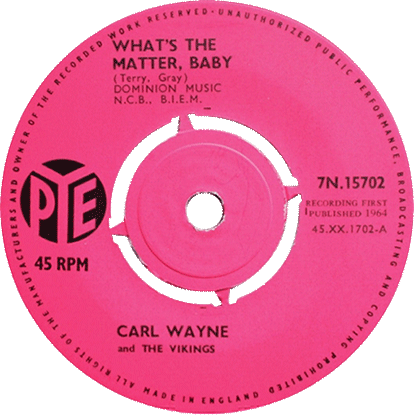
"Even when they did Chuck Berry it was all very polished"
Carl Wayne and The Vikings were signed to the Pye Records label in 1964 and recorded 'What's The Matter Baby' at Hollick & Taylor Studios in Handsworth for their first single. Soon after, bass guitarist Barry Harber left the band for a career in life insurance to be replaced temporarily by Tony Lewis from "Ronnie and The Senators".
Terry Wallace remembered; "It never worked out with Tony Lewis. We were playing at the Old Hill Plaza along with our old singer Keith Powell and his Valets. In the band was this blonde-haired lad moving like a demon, singing like a bird, and twanging his bass like we'd never heard before. Carl said straight away He's for us!"
Chris "Ace" Kefford was born on December 10, 1946 and was from Yardley Wood. A big fan of The Shadows bass guitarist Jet Harris, Chris joined his first band called "Chris and The Shades", a line-up that was put together by his older uncle (also named Chris). They later became "Steve Farron and The Chantelles" but had disbanded by the end of 1963.
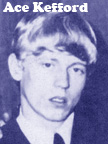
Chris Kefford along with his uncle joined well-known Birmingham singer Danny King's backing group known as "The Jesters" for some bookings. To avoid name confusion with his uncle, the youngest Kefford took the stage name of "Ace the Bass" which soon stuck.
Ace Kefford had joined Keith Powell's Valets after a visit to Jones & Crossland music store where he was told The Valets needed a bass player to fill in for a few gigs. At the time, Ace was earning a wage by shoveling cement on a construction site.
When asked about joining The Vikings for the then considerable sum of twenty pounds a week, Ace Kefford recalled; "I snapped it up though I wasn't too happy about the shirts, ties, and velvet collared suits they wore or their music which was mainly Top 20, and smoochy ballads like 'My Prayer'. Even when they did Chuck Berry it was all very polished."
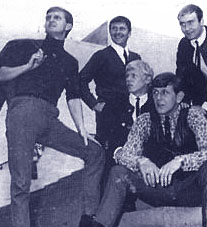
The next Carl Wayne and The Vikings single produced by Alan Freeman and released by Pye Records was a song entitled 'This Is Love'. It was composed by Danny King who also duetted with Carl on the vocal but like the first Vikings single, it did not sell enough copies to make the record charts. As a last attempt, another Carl Wayne and The Vikings 45, a cover of Otis Redding's 'My Girl' was issued in the USA only but met with little interest there.
Ace Kefford said; "Nothing happened with the singles, yet we didn't care because at least we had records out which meant we could say we were 'Pye recording stars' on the posters." After the cancellation of their record contract, Carl Wayne and The Vikings secured more German bookings in early 1965 but before they were to leave, drummer Dave Hollis left and was replaced by Bev Bevan who had played in a well known local group called The Diplomats (see Denny Laine and The Diplomats).
"I thought I'd got some sort of reputation in the city as a drummer"
Bev Bevan wrote in his book; "I had to attend an audition (for The Vikings). I thought I'd got some sort of reputation in the city as a drummer. To be told I would have to prove myself from scratch again brought me down to earth. There were ten of us being put through our paces in a youth club. It was so nerve-racking that whenever we asked people to audition for ELO in later years, I at least appreciated what they were going through."
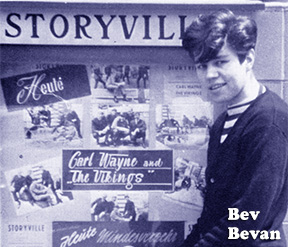
Carl Wayne and The Vikings departed for the "Storyville" clubs in Dusseldorf and Cologne but the working conditions in Germany were gruelling by this time with so many other British groups competing to perform there in hopes of making big money and emulating the success of The Beatles.
Bev Bevan recalled; "We started performing each night at 7 p.m. and did seven 45 minute spots with 15 minute breaks until two o'clock in the morning. Each weekend there were three-hour matinees too. When we arrived, the accommodation was ankle-deep in rubish, infested with rats, and there was blood and semen stains on the bed. We spent what little spare time we had cleaning it all up."
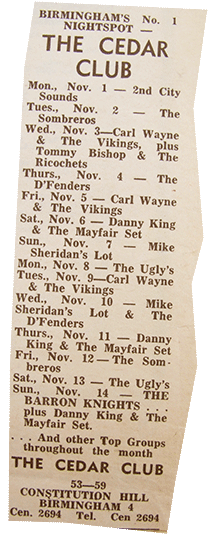
After returning to Birmingham, The Vikings secured a residency at "The Cedar Club" on Constitution Hill. At that time in Birmingham, the Cedar Club was the place to go and see the "happening" acts. Other local bands who performed there regularly was Danny King and The Mayfair Set and Mike Sheridan and The Nightriders. Various band-members would sometimes get together on stage for spontaneous jam sessions at the club.
A group from London called "Davy Jones & The Lower Third" were performing at The Cedar Club one evening late in 1965. Their singer (who would later change his name to David Bowie) mentioned to Trevor Burton from The Mayfair Set and Ace Kefford from The Vikings that they should consider forming their own group.
Roy Wood from Mike Sheridan and The Nightriders was also interested in this idea and when Ace Kefford informed Carl Wayne of their plan, Carl offered his services as frontman. Bev Bevan was chosen as the drummer after John Bonham (who was at that time playing with Kefford's uncle's group The Way Of Life) turned them down. Bonham would later join Robert Plant's line-up The Band Of Joy).
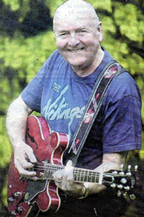
In this way "The Move" were formed (see The Move) but for The Vikings - one of Birmingham's top live performing groups - it was the end. Guitarist Johnny Mann became Roy Wood's replacement in The Nightriders and Terry Wallace joined "Mike Sheridan's New Lot" (see Mike Sheridan and The Nightriders).
Terry later formed a successful folk music trio called The Southeners along with his wife Cheryl as lead vocalist and Robbie Harper on bass guitar. Sadly, Terry Wallace passed away from cancer in August 2008 (to see BrumBeat feature on Terry Wallace click HERE).
Sources: 'Brum Rocked!' by Laurie Hornsby 1999; 'The Electric Light Orchestra Story' by Bev Bevan 1980; 'Ace Kefford interview - Record Collector July 1994' by Alan Clayson; plus contributions from Pete Bryan, George Mann, Allan Compton, and Keith Powell.
Copyright © John R Woodhouse
Carl Wayne and The Vikings 1960s Record Releases
Singles: